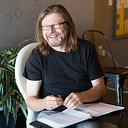Member-only story
The Business of Screenwriting: The Phone Call
“They want your script.”
Exactly thirty-six years ago today, this happened.
It’s 10:00AM, Monday, January 19, 1987. I pile into my ten-year-old beat-up Ford filled with the gear of my trade: guitar, amplifier, PA system and speakers, suitcase, and most importantly a big trunk in which I have all my props, and a dolly to move said trunk up and down nightclub stairs.
I key the ignition — never sure if the car will start or not. This morning, it does. I have a 6 hour drive ahead of me from Berkeley, where I live with my wife of eighteen months as she completes her B.A. at Cal, and Southern California where I will be performing for the next six weeks, four nights a week in Ventura, three nights in Thousand Oaks.
Two year ago, I switched my act from musician to musician-comedian for reasons that still aren’t entirely clear to me. Yes, I’m funny, and I’ve made a living, such as it is, performing in a blur of clubs. But is this really what I want to be doing with my life?
Fortunately, there is this other thing I’ve discovered: screenwriting.
For the last year, I have traveled up and down the state performing in clubs all over southern and northern California, but my creative focus has been on learning the craft of screenwriting. I’ve written two bad scripts, but this third one feels like a winner. It’s called K-9. The idea is inspired by the story of a Ventura County policeman whose canine police partner was shot and killed in the line of duty. When I met with the cop, a burly guy with thick muscles, he pulled out some photos of the dog — and started to cry. He was so attached to his deceased partner, he felt he could no longer do police work, opting to become a firefighter instead.
How could a tough cop bond that deeply with a police dog? That question became the heart and soul of the script my partner and I would write — a comedy with some heart.
Our writing process has been this: We’d get together when I was in Ventura, talk through the story, then I’d go on the road, working it through further, driving and brainstorming ideas, scenes, and potential dialogue into a cheap hand-held tape recorder. I scheduled breaks from the club circuit so I could take a week off here, a few days there to transcribe notes and pound out pages at home. I’d bring those pages back to SoCal and we’d work through them. Then after another round of gigs, I’d return…

